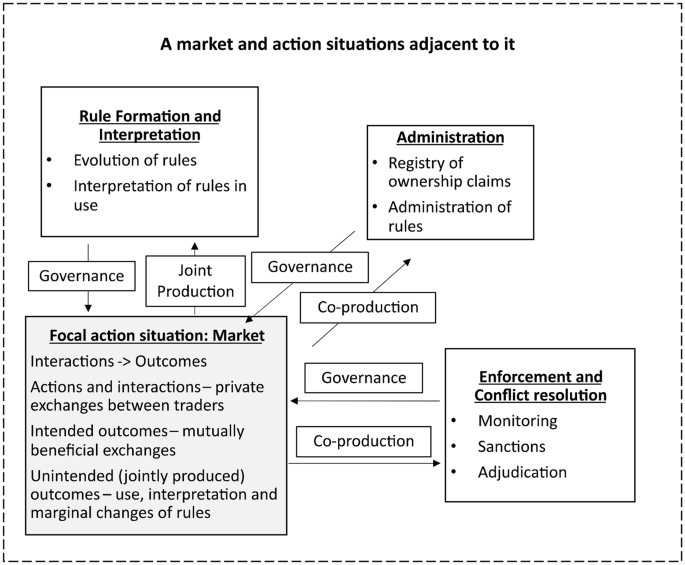市场和知识公地:市场的私人治理和社区治理有区别吗?
IF 1.6
3区 经济学
Q2 ECONOMICS
引用次数: 0
摘要
市场治理既可以由公共(国家)组织提供,也可以由私人组织提供。然而,本文认为,私人治理的概念被用来指两种不同的非国家治理形式:私人治理和社区治理。我们对这两种形式进行了区分,认为私人治理应被理解为由(外部)私人方提供市场治理,而社区治理是指一个群体、社区或社会在不受外部权威干预的情况下自主管理自己事务的过程。前者内部化了与治理相关的外部性,而后者主要是市场中社会互动的意外外部性。为了进一步阐明这些非国家治理类型的差异和相对优势,我们区分了市场治理的三个要素:(1)规则的形成和解释,(2)所有权和交换规则的管理,以及(3)规则的执行。我们认为,社区治理与所有权和交换规则的形成和解释非常相关,因此很难将其外包给外部各方,无论是私人还是公共。社区治理还通过共同生产的过程在管理和执行中发挥了经常被忽视的作用。规则的形成和解释被理论化为市场治理的认知成分,可以在治理知识共享框架内进行分析。本文章由计算机程序翻译,如有差异,请以英文原文为准。

Markets and knowledge commons: Is there a difference between private and community governance of markets?
Abstract It is well-established that market governance can be provided by both public (state) and private organizations. However, the concept of private governance has been used, this article contends, to refer to two distinct forms of non-state governance: private governance and community governance. We distinguish between these two forms, arguing that private governance should be understood as the provision of market governance by (external) private parties, while community governance refers to a process where a group, a community, or society has the autonomy to govern its own affairs without interference from external authorities. The former internalizes the externalities associated with governance, while the latter comes about mainly as an unintended externality of social interaction in markets. To further illuminate the differences, and the relative strengths of these types of non-state governance, we distinguish among three elements of market governance: (1) the formation and interpretation of rules, (2) the administration of rules of ownership and exchange, and (3) the enforcement of rules. We argue that community governance is of great relevance for the formation and interpretation of the rules of ownership and exchange, which is consequently very hard to outsource to external parties, private or public. Community governance also plays a frequently overlooked role in administration and enforcement through the process of co-production. Rule formation and interpretation are theorized as the epistemic components of market governance, which can be analyzed within the Governing Knowledge Commons framework.
求助全文
通过发布文献求助,成功后即可免费获取论文全文。
去求助
来源期刊

Public Choice
Multiple-
CiteScore
3.60
自引率
18.80%
发文量
65
期刊介绍:
Public Choice deals with the intersection between economics and political science. The journal was founded at a time when economists and political scientists became interested in the application of essentially economic methods to problems normally dealt with by political scientists. It has always retained strong traces of economic methodology, but new and fruitful techniques have been developed which are not recognizable by economists. Public Choice therefore remains central in its chosen role of introducing the two groups to each other, and allowing them to explain themselves through the medium of its pages.
Officially cited as: Public Choice
 求助内容:
求助内容: 应助结果提醒方式:
应助结果提醒方式:


